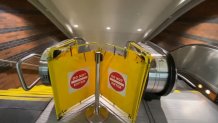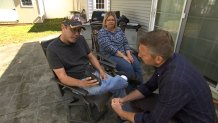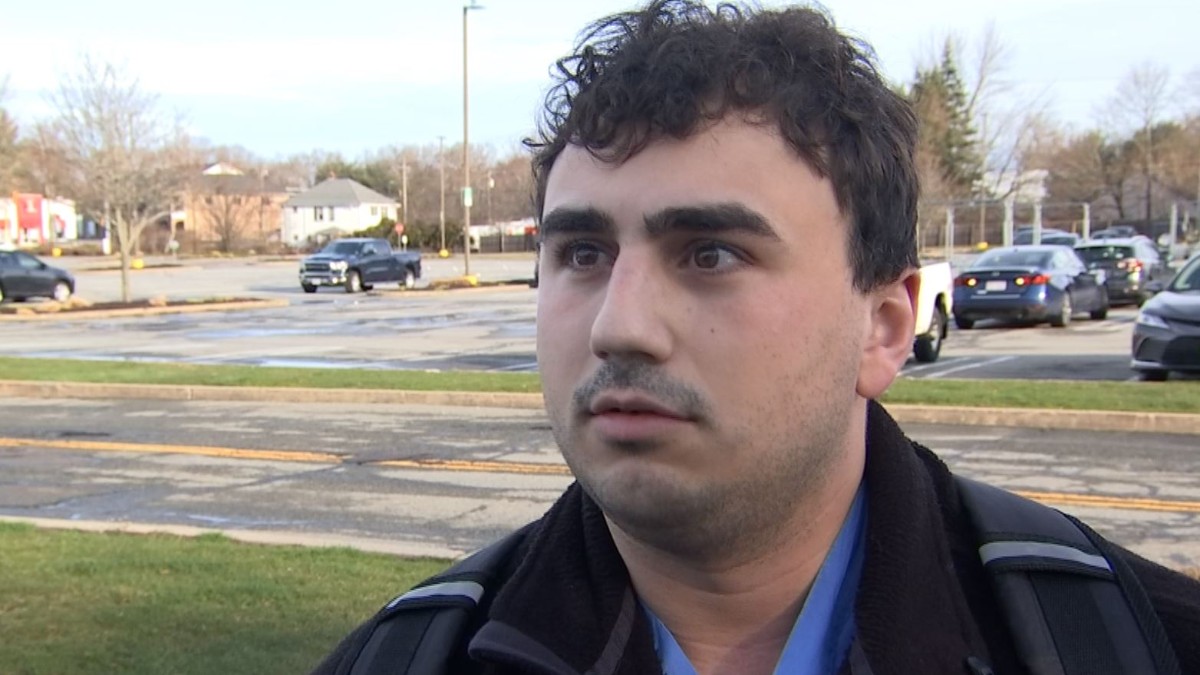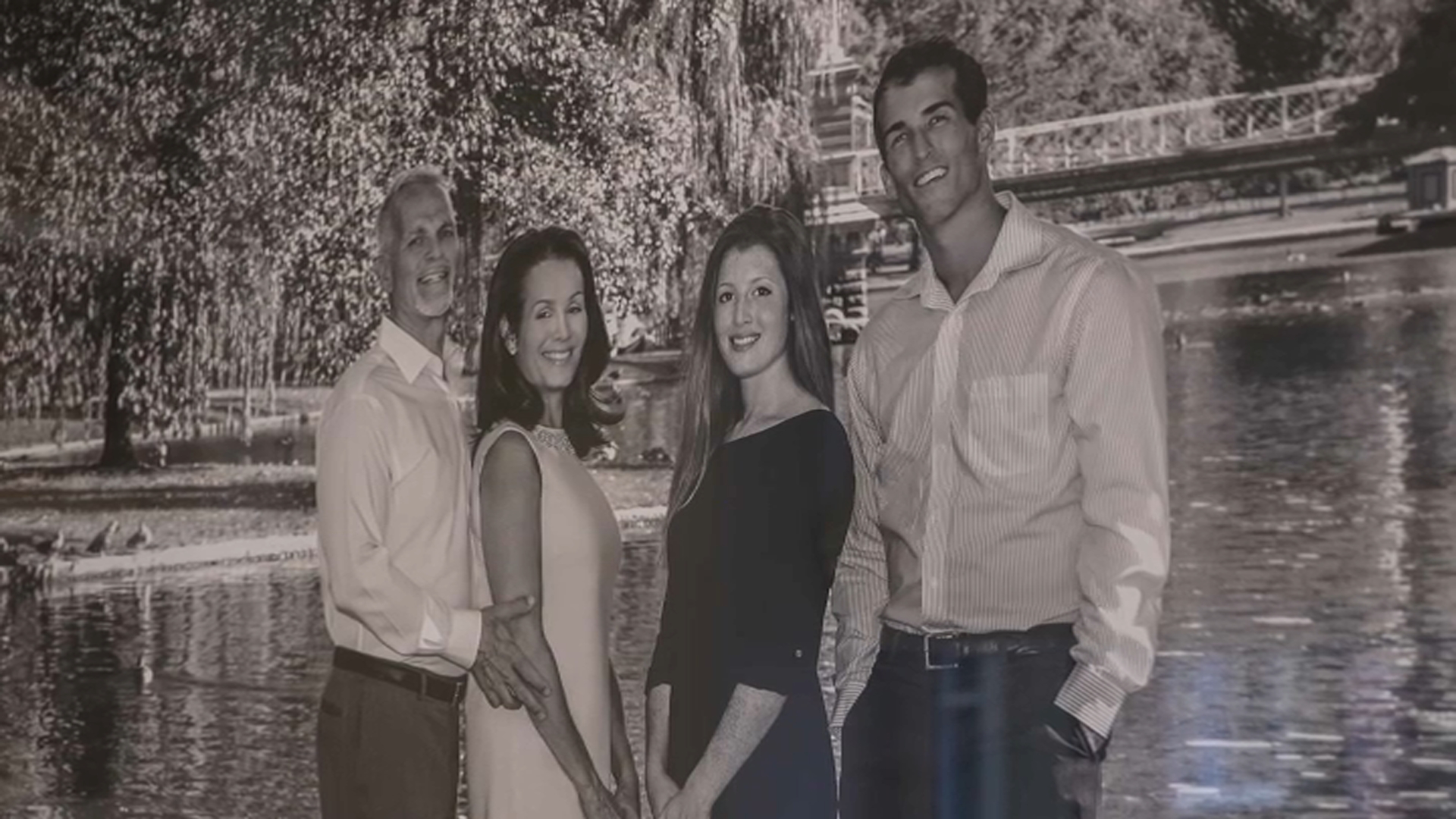Ten years later, John Dwyer said the sounds of people screaming is what still sticks with him the most.
On June 18, 2011, Dwyer and his wife, Leslie, took the train up to Boston from their home in Johnston, Rhode Island, for the Bruins Stanley Cup parade. His dad joined them for the festivities.
When they arrived at the Back Bay MBTA station, Dwyer stepped onto an escalator that would take them to the street level. His wife and dad stood in front of him as they ascended.
"All of a sudden, the escalator jerked forward," Dwyer recalled. "Just about the time you thought in your mind that something didn't seem right, you were falling backwards. The escalator was going full speed in reverse."
Get New England news, weather forecasts and entertainment stories to your inbox. Sign up for NECN newsletters.
In the chaos that ensued, Dwyer was pinned beneath a pile of other people. The escalator steps scraped and gouged his back as they continued to move.
"I couldn't find him," Leslie Dwyer recalled. "I looked at the ground and all I could see were his eyes and his nose. There were people all over, crushing him."
Luckily, two fast-acting Bruins fans wearing Chara and Neely jerseys quickly pulled people off Dwyer and got him away from the danger. Someone else hit the emergency stop button.
As the adrenaline wore off, Dwyer said he started to feel the burning of the scrapes on his back. He struggled to find medical treatment to clean and bandage the wounds. The family ended up missing most of the parade.

"It was a couple of seconds of terror you don't want to re-live," Leslie Dwyer said.
Investigations
So you can imagine how the couple reacted when they heard about an eerily similar escalator malfunction at the exact same MBTA station on Sept. 26.
"It brought everything back," John Dwyer said. "It was extremely similar with the description of how the escalator moved and how people fell like dominoes. I was angry."
It is not just the Back Bay station that has a shaky history with escalators. In a review of court records, the NBC10 Investigators found more than 50 lawsuits at MBTA stations all over the Boston area.
Some of the summaries:
- A Hyde Park woman fell and sustained injuries when an escalator at the Forest Hills station suddenly reversed downward in November 2018. Her medical bills exceeded $8,000, according to the complaint.
- A woman who lives on Beacon Hill started walking on a stationary escalator at the Park St. station in December 2011. As she reached the top, the escalator powered on and moved in reverse. "It was like having your feet swept out from under you," she told NBC10 Boston.
- A Dorchester woman was on a Silver Line escalator in November 2006 when it "abruptly stopped" and she fell.
Records show the majority of the cases were settled outside of court for undisclosed amounts.
George Pesiridis was holding a coffee as he descended on an escalator at the Harvard Square station in December 2009.
"All of a sudden it jerked and shuddered," Pesiridis described. "It knocked me off balance and I tumbled head over heels all the way to the bottom."
Pesiridis broke ribs and tore tendons from the fall. He missed several months of work while he recovered.
The car mechanic questions whether the escalators are getting the needed maintenance and repair work to spot issues before they become more serious.
"They keep putting off major work until something like this happens," Pesiridis said, referring to the recent Back Bay malfunction. "Then they turn around and do what really needs to be done."
The MBTA said the Back Bay escalator had its annual inspection in July and received state certification. It also received monthly maintenance checks from the contractor that maintains the T's network of 177 escalators.
That contractor, KONE Inc, is being paid $8.7 million this fiscal year for the escalator contract. Joe Pesaturo, an MBTA spokesman, said the frequency of maintenance activity at each escalator is structured around the passenger volume and the size of the unit.
While noting the MBTA escalators have an overall "availability rate" of nearly 99%, Pesaturo said in a statement, "The public's safety is of paramount importance, and the MBTA is committed to determining the underlying cause and working to ensure such an incident doesn't happen again."
A KONE spokesman did not respond to questions about the previous lawsuits or about what caused the 2011 incident at the Back Bay station. The company said it is collaborating with the MBTA to investigate the issue and will perform all necessary testing prior to the escalator being reinstated.
"KONE is fully committed to the safe operation of all units and passengers," the company said in a statement. "KONE routinely inspects and maintains units in full alignment with industry regulatory requirements and contractual agreements with each customer."

Dennis Olson is an escalator safety expert with more than 30 years of industry experience. He described the failure as "catastrophic" and said investigators will closely look at maintenance, repair and inspection records.
"You're going to find things that could have been done, or should have been done, but most likely were not done or not done adequately," Olson said.
With a stringent maintenance and service program, Olson said, incidents like what occurred on the Back Bay escalator should be preventable.
"The public needs to be concerned," he said. "This is an extreme incident that cannot be minimized."
From his home in Rhode Island, John Dwyer expressed frustration that he never heard what caused the scary malfunction he experienced in 2011. He hopes something changes this time.
"They better give a really good explanation of why it happened and why it continues to happen," Dwyer said. "I mean, how many more people have to get hurt?"

Ryan Kath can be reached at ryan.kath@nbcuni.com. You can follow him on Twitter or connect on Facebook.



